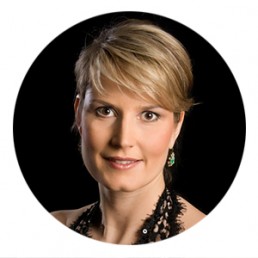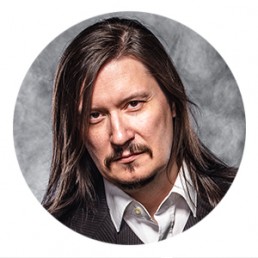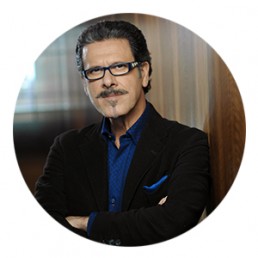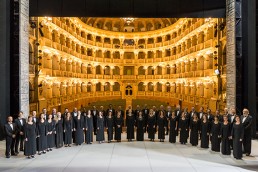BEETHOVEN
Asher Fisch
Born in 1959, Asher Fisch is an Israeli conductor and often works with leading European and American theatres and prestigious symphonic orchestras.
Acclaimed by the critics as one of the best interpreters of Wagner of our times, Asher Fisch has taken his extensive opera repertoire to the world’s greatest theatres, also acting as Music Director of the Israeli Opera of Tel Aviv and the Volksoper of Vienna. He is also an accomplished concert performer and pianist. He has conducted the Chicago Symphony, Dallas Symphony Orchestra, London Symphony Orchestra, Berliner Philharmonischer, Israel Philharmonic, NHK of Tokyo and many others orchestras.
Born in 1961, he studied piano and composition at the G. Verdi Conservatory in Milan. From 2002 to 2018 he was Chorus Master at the Teatro alla Scala in Milan, previously held the role of guest Chorus Master at Radio-France, piano accompanist for the Sommerakademie Mozarteum in Salzburg and worked extensively with the Teatro La Fenice in Venice and the Rossini Opera Festival in Pesaro. From 2019 he is Chorus Master at the Teatro Comunale di Bologna.
.
Camilla Nylund was born in 1968 in Vaasa/Finland. She studied with Professor Eva Illes and later at the Mozarteum in Salzburg. For her outstanding achievement she was awarded the Lilli Lehmann Medal in 1995 by the International Foundation of the Mozarteum.
Lioba Braun (Hanau 1957) has been teaching since 2010 at the Hochschule für Musik in Cologne. Throughout his long career he has sung in the world’s major theatres (at La Scala, at the Teatro Real in Madrid, at the Liceudi Barcelona, in Berlin, Dresden, Leipzig, Munich, Stuttgart, Zurich, Rome and Los Angeles).
Daniel Frank made his debut at the Stockholm Folkoperan in 2009. Before that, he worked for ten years as a rock singer, singing teacher, music and theater teacher. However, the world of opera soon became aware of this charismatic artist and his powerful voice.
Born in Taranto, he trained at the Elio Battaglia school. Winner of numerous national and international competitions (Conegliano Veneto, Francisco Vinas, “Mira Fattori” Prize), his prestigious artistic journey regularly sees him as a guest in the world’s leading concert halls and opera houses. He combines his opera career with intense liederistic and oratorial activity. He taught vocal technique at the Pescara Music Academy and teaches master classes at the “Hugo Wolf” High School directed by Maestro Elio Battaglia.
Program
LUDWIG VAN BEETHOVEN
Choral fantasy for piano, chorus and orchestra op. 80
LUDWIG VAN BEETHOVEN
Symphony n. 9 in D minor for choir and orchestra only op. 125 “Choral”
ComposER
Choral fantasy for piano, chorus and orchestra op. 80
Year of composition: 1808
First performance: Vienna, Theatre an der Wien, December 22, 1808
Movements:
- Adagio, Allegro
- Meno Allegro
- Allegretto ma non troppo
The Choral Fantasy represents, within Beethoven’s works, an experiment: on the one hand, the composer inserts the Chorus into a symphonic piece, placing it in the last part of the composition, on the other hand he experiences in the finale what will then be the formal core of the Ninth Symphony. The last movement of the Choral Fantasy, in fact, recalls the Ode to Joy not only in the melody but also in the themes dealt with by the text, based on Christoph Kuffner’s Schmeichelnd hold (Polite flattery).
Symphony n. 9 in D minor for choir and orchestra only op. 125 “Choral”
Year of composition: 1822/1824
First performance: Vienna, Theatre am Kärntnertor, May 7, 1824
Movements:
1. Allegro ma non troppo e un poco maestoso
2. Molto vivace
3. Adagio molto e cantabile
4. Presto
Since the evening of May 7, 1824, the musical page of the Ninth Symphony “has not stopped talking”, because it has never ceased to invest it with a universal mission, which would seem to transcend the tasks and dimensions of a symphony. “It has not stopped talking” not even in the 20th century, when the Ode to Joy was transformed into a declaration of universal brotherhood and freedom. The complete loss of hearing did not prevent Beethoven from composing the emotional crescendo that is the Ninth Symphony: on the evening of the first performance in Vienna, the audience listened to the dense progress of the Allegro which forms the first movement, it was literally lashed by the violence of the Scherzo placed in second position, drawn into the longest and most heartrending Adagio that had ever been heard. The final movement was a leap into the void, into the unprecedented.
ORCHESTRA E CHORUS OF THE TEATRO COMUNALE DI BOLOGNA
With its long-standing tradition, the Orchestra of the Teatro Comunale di Bologna has been led by Musical Directors like Sergiu Celibidache, Zoltán Peskó, Vladimir Delman, Riccardo Chailly, Daniele Gatti, Michele Mariotti. Some of the conductors who have worked with the ensemble include Gary Bertini, Myung-Whun Chung, James Conlon, Pinchas Steinberg, Valery Gergiev, Eliau Inbal, Vladimir Jurowskij, Daniel Oren, Peter Maag, Neville Marriner, Kurt Masur, Riccardo Muti, Mstislav Rostropovič, Esa Pekka Salonen, Georg Solti, Christian Thielemann, Charles Dutoit, Georges Prêtre. The Orchestra of the Teatro Comunale is often invited abroad (The Netherlands, Romania, Spain, France, and Switzerland) and has played in many prestigious festivals (Amsterdam 1987, Parma 1990, Wiesbaden 1994, Santander 2004 and 2008, Aix en Provence 2005, Savonlinna 2006, Macao 2013, Muscat 2015, Guanajuato in Mexico 2017, Paris 2018). A special connection with Japan has brought to several tours, including the tour in June 2019 in Osaka, Tokyo, Yokohama, Fukuoka, with performances of Rigoletto directed by Alessio Pizzech, and of Il Barbiere di Siviglia directed by Federico Grazzini.
Its numerous recordings include La Favorite conducted by Richard Bonynge; Oberto Conte di San Bonifacio conduted by Zoltán Peskó, Il Barbiere di Siviglia conducted by Giuseppe Patané, La Fille du Régiment conducted by Bruno Campanella, Le Maschere and La Bohème conducted by Gianluigi Gelmetti, La Scala di Seta conducted by Gabriele Ferro, Macbeth, Manon Lescaut, Rigoletto, La Cenerentola, Messa Solenne, and the video production of Vespri siciliani and Giovanna d’Arco and Werther conducted by Riccardo Chailly, Armide conducted by Daniele Gatti, Simon Boccanegra conducted by Michele Mariotti.
The Orchestra, conducted by Michele Mariotti, has recorded a CD under the label Decca with sacred arias sung by Juan Diego Flórez, and an album under Sony with Romantic arias sung by Nino Machaidze. Under Deutsche Grammophon the Orchestra recorded Le Comte Ory with Flórez, and La Nuit de Mai – a selection or arias and songs by Leoncavallo – with Placido Domingo. Under the label PENTATONE it recently released a CD containing overtures by Rossini, to celebrate 150 years since the death of the composer.
In March 2013 the artistic ensembles of the Teatro Comunale di Bologna, led by Michele Mariotti, opened the IV International Festival Mstislav Rostropovich in Moscow, where they performed Verdi’s Messa da Requiem. In October 2015, again with Michele Mariotti on the podium, they opened the Lingotto Music Festival at the Auditorium Giovanni Agnelli in Turin, where they performed Stabat Mater by Rossini, and his Overture and Ballet Music from Guillaume Tell.
After working with the Rossini Opera Festival for nearly thirty years (from 1988 to 2016), the year 2017 brought new collaborations between the Teatro Comunale di Bologna and the Verdi Festival in Parma, where the Orchestra performed, among other productions, the Stiffelio directed by Graham Vick. Staged at the Teatro Farnese, the show was highly appreciated by audience and critics alike and was granted the Special Prize at the 37th edition of the “Franco Abbiati” Critics award. The Orchestra’s engagements with the Verdi Festival for the Fall of 2019 include Luisa Miller at the Chiesa di San Francesco del Prato in Parma, and Aida at the Teatro Verdi in Busseto.
The Teatro Comunale’s 2018 production of La Bohème staged by Graham Vick received the Abbiati Award as best show.
Considered one of the most prestigious ensembles worldwide, through the years the Chorus has been led by Gaetano Riccitelli, Leone Magiera, Fulvio Fogliazza, Fulvio Angius, Piero Monti, Marcello Seminara, Paolo Vero, Lorenzo Fratini, Andrea Faidutti, and, since 2019, Alberto Malazzi. Among its many recordings are those of La Favorita, Macbeth, Manon Lescaut, Rigoletto, La Cenerentola, and Rossini’s Messa Solenne. Its numerous international tours include Amsterdam (1987), Wiesbaden (1994), Japan (1993, 1998, 2002, 2006, 2011, 2017), Savonlinna (2006), Santander (2008), Muscat (2015), Paris (2018). In 2001 the Chorus performed Verdi’s Messa da Requiem at the London Royal Albert Hall within the BBC Proms Festival, with the Royal Philharmonic Orchestra conducted by Daniele Gatti. In June 2019 the Chorus is again touring Japan (Osaka, Tokyo, Yokohama, Fukuoka) with Rigoletto conducted by Alessio Pizzech, and Il Barbiere di Siviglia conducted by Federico Grazzini.
Noteworthy is its return to the Rossini Opera Festival from 2009 to 2016, where in 2011 the Chorus was part of the production of Mosè in Egitto, directed by Graham Vick and conducted by Roberto Abbado, that won the “Abbiati” award as best show for that year.
In 2017 the Chorus was at the Verdi Festival in Parma performing Traviata, and the Stiffelio directed by Graham Vick at the Teatro Farnese that was awarded the “Franco Abbiati” Special Prize.
Its engagements with the Verdi Festival for the Fall of 2019 will see the Chorus perform Luisa Miller at the Chiesa di San Francesco del Prato in Parma, and Aida at the Teatro Verdi in Busseto.
The Teatro Comunale’s 2018 production of La Bohème staged by Graham Vick received the Abbiati Award as best show.









